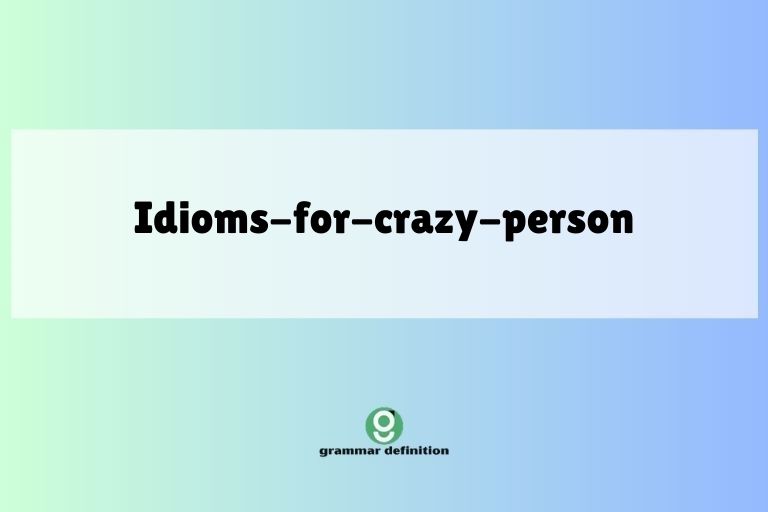Idioms for Crazy Person: A Comprehensive Guide

Understanding idioms is crucial for mastering the English language, especially when describing nuanced concepts such as mental instability or eccentric behavior. Idioms add color and depth to communication, allowing speakers to convey complex ideas with brevity and impact.
This article delves into a variety of idioms used to describe someone considered “crazy,” “eccentric,” or “mentally unstable,” providing definitions, examples, and usage guidelines. This comprehensive guide is designed for English language learners of all levels, from beginners seeking to expand their vocabulary to advanced speakers aiming to refine their expressive abilities.
By exploring these idioms, learners will gain a deeper appreciation for the richness and complexity of the English language. Furthermore, understanding these expressions will enhance comprehension of spoken and written English, especially in informal contexts such as conversations, literature, and media.
This article will break down each idiom, providing context, usage examples, and potential pitfalls to avoid, ensuring you can use these expressions accurately and appropriately.
Table of Contents
- Introduction
- Definition
- Structural Breakdown
- Types and Categories
- Mild Eccentricity
- Moderate Instability
- Severe Derangement
- Humorous Idioms
- Euphemistic Idioms
- Examples
- Mild Eccentricity Examples
- Moderate Instability Examples
- Severe Derangement Examples
- Humorous Idioms Examples
- Euphemistic Idioms Examples
- Usage Rules
- Common Mistakes
- Practice Exercises
- Exercise 1: Matching Idioms
- Exercise 2: Fill in the Blanks
- Exercise 3: Sentence Construction
- Exercise 4: Error Correction
- Advanced Topics
- FAQ
- Conclusion
Definition
An idiom is a phrase or expression whose meaning cannot be understood from the ordinary meanings of the words it contains. In other words, the phrase has a figurative meaning that is different from the literal meaning.
Idioms related to “crazy person” are expressions used to describe individuals perceived as mentally unstable, eccentric, or exhibiting unusual behavior. These idioms can range from mild and humorous to severe and derogatory, depending on the intended context and the speaker’s attitude.
These idioms serve various functions in communication. They can be used to:
- Express Humor: Lighten the mood when discussing eccentric behavior.
- Convey Criticism: Subtly or directly express disapproval of someone’s actions.
- Provide Euphemisms: Soften the impact of discussing mental health issues.
- Add Emphasis: Highlight the intensity of someone’s unusual behavior.
Understanding the context in which these idioms are used is crucial. The same idiom can have different connotations depending on the tone of voice, the relationship between the speakers, and the overall situation.
Therefore, it’s important to learn not only the meaning of the idiom but also its appropriate usage.
Structural Breakdown
Idioms generally don’t follow standard grammatical rules. Their structure is fixed, meaning the words cannot be changed or rearranged without altering or losing the intended meaning.
The structure of idioms related to “crazy person” can vary widely, but some common patterns include:
- Similes: Using “like” or “as” to compare someone to a crazy person or thing (e.g., “mad as a hatter”).
- Metaphors: Implying someone is crazy without direct comparison (e.g., “off their rocker”).
- Phrasal Verbs: Using a verb and a preposition to create a figurative meaning (e.g., “lose it”).
- Noun Phrases: Using a noun phrase to describe someone’s state of mind (e.g., “a few screws loose”).
These structures often rely on figurative language and cultural references, which can make them challenging for non-native speakers to understand. For example, the idiom “mad as a hatter” originates from the historical use of mercury in hat-making, which caused neurological damage in hatters, leading to erratic behavior.
Understanding the historical or cultural context can often shed light on the idiom’s meaning.
The key to understanding these idioms is recognizing that their meaning is not literal. Instead, you must learn the idiomatic meaning as a whole unit.
Trying to dissect the individual words will often lead to confusion and misinterpretation.
Types and Categories
Idioms describing someone as “crazy” can be categorized based on the severity and tone of the expression. Here are some common categories:
Mild Eccentricity
These idioms describe someone who is a bit unusual or quirky but not necessarily mentally unstable. They often carry a humorous or affectionate tone.
Moderate Instability
These idioms suggest a more significant departure from normal behavior, implying some level of mental or emotional instability. They are generally more serious than idioms describing mild eccentricity.
Severe Derangement
These idioms indicate a serious mental condition or a complete loss of touch with reality. They are often considered offensive and should be used with caution.
Humorous Idioms
These idioms are used to describe someone’s craziness in a lighthearted or funny way. They are often used in informal settings and are not intended to be offensive.
Euphemistic Idioms
These idioms are used to soften the impact of describing someone as crazy or mentally ill. They are often used when discussing sensitive topics or when trying to avoid causing offense.
Examples
The following tables provide examples of idioms related to “crazy person,” categorized by the types discussed above.
Mild Eccentricity Examples
This table provides examples of idioms used to describe mild eccentricity. These idioms often carry a humorous or affectionate tone, suggesting that someone is a bit unusual but not necessarily mentally unstable.
The “Meaning” column provides a brief explanation of the idiom’s figurative meaning, while the “Example Sentence” column illustrates how the idiom can be used in context.
| Idiom | Meaning | Example Sentence |
|---|---|---|
| A few cards short of a full deck | Not very intelligent or sensible. | He’s a nice guy, but he’s a few cards short of a full deck. |
| A few sandwiches short of a picnic | Not very intelligent or sensible. | I think she’s a few sandwiches short of a picnic if she thinks that’s going to work. |
| Not the sharpest tool in the shed | Not very intelligent or bright. | He’s not the sharpest tool in the shed, but he’s always willing to help. |
| A bit touched | Slightly eccentric or crazy. | My aunt is a bit touched, but she’s harmless. |
| A screw loose | Slightly crazy or eccentric. | I think he’s got a screw loose; he’s always doing strange things. |
| Off-kilter | Unconventional or slightly strange. | Her sense of humor is a bit off-kilter, but I find it amusing. |
| Quirky | Having peculiar or unusual habits or characteristics. | He’s a quirky character, but everyone likes him. |
| A character | An eccentric or unusual person. | Old Mr. Henderson is quite a character; he always wears a top hat. |
| Marches to the beat of their own drum | Behaves independently and unconventionally. | She’s always marched to the beat of her own drum, and I admire that about her. |
| Out to lunch | Not paying attention or behaving strangely. | He seems a bit out to lunch today; I wonder what’s on his mind. |
| Got their wires crossed | Confused or mistaken. | I think they’ve got their wires crossed about the meeting time. |
| Not all there | Mentally absent or not fully aware. | He seems not all there today; he keeps forgetting things. |
| A little nutty | Slightly crazy or eccentric. | She’s a little nutty, but she’s a lot of fun to be around. |
| A little batty | Slightly crazy or eccentric. | My grandmother is a little batty, but she has a heart of gold. |
| A bit daft | Silly or foolish. | He’s a bit daft, but he means well. |
| Slightly bonkers | Slightly crazy or eccentric. | She’s slightly bonkers, but she’s brilliant at her job. |
| A little loopy | Slightly crazy or eccentric. | He’s a little loopy after staying up all night. |
| Off the wall | Unconventional or bizarre. | His ideas are often off the wall, but sometimes they work. |
| Left-field | Unconventional or unexpected. | Her approach to the problem was a bit left-field, but it was effective. |
| A strange bird | An odd or eccentric person. | He’s a strange bird, but he’s harmless. |
| Has a mind of their own | Independent and unconventional in thinking. | She has a mind of her own and isn’t afraid to express it. |
| A free spirit | Someone who lives life according to their own rules and values. | He’s a free spirit, traveling the world and living life to the fullest. |
| His own man | Independent and self-reliant. | He’s his own man and doesn’t let anyone tell him what to do. |
| A law unto themselves | Disregard rules and conventions. | They’re a law unto themselves and do whatever they want. |
| A maverick | An independent-minded person. | She’s a maverick in the industry, always challenging the status quo. |
Moderate Instability Examples
This table lists idioms that indicate moderate mental or emotional instability. These expressions are more serious than those describing mild eccentricity and suggest a more significant departure from normal behavior.
It’s important to use these idioms with caution and sensitivity.
| Idiom | Meaning | Example Sentence |
|---|---|---|
| Going bananas | Becoming very excited, angry, or crazy. | The crowd went bananas when the band came on stage. |
| Losing it | Becoming unable to think clearly or control your emotions. | He started losing it when he heard the news. |
| Off their rocker | Crazy or mentally unstable. | I think she’s off her rocker if she thinks she can get away with that. |
| Out of their mind | Crazy or insane. | You must be out of your mind to go out in this weather. |
| Round the bend | Crazy or eccentric. | He’s gone completely round the bend since he lost his job. |
| Batty as a fruitcake | Very eccentric or crazy. | She’s as batty as a fruitcake, but she’s a lot of fun. |
| Mad as a hatter | Completely crazy or insane. | He’s as mad as a hatter, always talking to himself. |
| Not right in the head | Mentally unstable or not thinking clearly. | I don’t think he’s right in the head; he’s been acting very strangely lately. |
| A basket case | Someone who is emotionally or mentally unstable. | After the accident, she was a complete basket case. |
| On the edge | Experiencing heightened anxiety or stress. | He’s been on the edge ever since he started the new project. |
| Losing their marbles | Becoming forgetful or mentally unstable due to old age. | My grandfather is starting to lose his marbles; he can’t remember where he put his keys. |
| Going off the deep end | Becoming irrational or uncontrollable. | He went off the deep end when he found out about the betrayal. |
| Having a breakdown | Experiencing a period of mental or emotional collapse. | She had a breakdown after months of working long hours. |
| Crackers | Crazy or eccentric. | He’s completely crackers; he believes he can fly. |
| Unhinged | Mentally disturbed or unstable. | Her behavior has become increasingly unhinged since the trauma. |
| Not playing with a full deck | Not very intelligent or sensible. | He’s not playing with a full deck, but he’s a good-hearted person. |
| Off the rails | Behaving in a wild or uncontrolled way. | He went completely off the rails after his divorce. |
| Around the bend | Crazy or eccentric. | I think he’s gone around the bend, talking to imaginary friends. |
| Out to pasture | Retired or no longer useful. | They sent him out to pasture after 40 years of service. |
| A sandwich short of a picnic | Not very intelligent or sensible. | He’s a sandwich short of a picnic, but he’s always entertaining. |
| One brick short of a load | Not very intelligent or sensible. | She’s one brick short of a load, but she’s creative. |
| A bit touched in the head | Slightly crazy or eccentric. | He’s a bit touched in the head, but he’s harmless. |
| A wacko | A crazy or eccentric person. | He’s a wacko, but he’s a genius. |
| A nutcase | A crazy or eccentric person. | She’s a nutcase, but she’s lovable. |
| A loon | A crazy or eccentric person. | He’s a loon, but he’s kind. |
Severe Derangement Examples
This table presents idioms that suggest severe mental derangement or a complete break from reality. These idioms are often considered offensive and should be used with extreme caution, if at all.
It’s important to remember that mental health is a sensitive topic, and using such language can be harmful and stigmatizing.
| Idiom | Meaning | Example Sentence |
|---|---|---|
| Stark raving mad | Completely insane or out of control. | He was stark raving mad after the accident. |
| Certifiably insane | Officially diagnosed as mentally ill. | The court declared him certifiably insane. |
| Gone to the dogs | Deteriorated or become ruined. | His life has gone to the dogs since he lost everything. |
| Off their trolley | Crazy or eccentric. | I think she’s off her trolley if she believes that. |
| Out of their tree | Crazy or insane. | You must be out of your tree to risk your life like that. |
| Around the twist | Crazy or eccentric. | He’s gone completely around the twist since he retired. |
| Mad as a March hare | Completely crazy or insane. | She’s as mad as a March hare, always talking nonsense. |
| Lost their mind | Become insane or irrational. | He’s lost his mind if he thinks he can win the election. |
| A raving lunatic | A person who is completely insane and out of control. | He was acting like a raving lunatic, screaming at everyone. |
| Completely bonkers | Completely crazy or eccentric. | She’s completely bonkers, but she’s brilliant at her job. |
| Totally deranged | Mentally unstable or disturbed. | His behavior was totally deranged, scaring everyone around him. |
| Lost all sense | Become irrational or unable to think clearly. | He lost all sense when he started gambling. |
| Gone completely mental | Become extremely agitated or crazy. | He went completely mental when he heard the news. |
| Bounced off the walls | Extremely excited or hyperactive. | The kids were bouncing off the walls after eating all that sugar. |
| Driven out of their mind | Made insane or irrational by stress or trauma. | The constant pressure drove her out of her mind. |
Humorous Idioms Examples
This table contains idioms used to describe someone’s craziness in a lighthearted or funny way. These expressions are typically used in informal settings and are not intended to be offensive.
However, it’s still important to be mindful of the context and your audience.
| Idiom | Meaning | Example Sentence |
|---|---|---|
| A sandwich short of a picnic | Not very smart or sensible. | He’s a sandwich short of a picnic, but he’s a good guy. |
| A few fries short of a Happy Meal | Not very smart or sensible. | She’s a few fries short of a Happy Meal, but she’s always cheerful. |
| One spanner short of a tool set | Not very smart or sensible. | He’s one spanner short of a tool set, but he’s resourceful. |
| A couple of buttons short of a shirt | Not very smart or sensible. | She’s a couple of buttons short of a shirt, but she’s creative. |
| Two cents short of a nickel | Not very smart or sensible. | He’s two cents short of a nickel, but he’s hard-working. |
| Living in their own world | Out of touch with reality. | She’s living in her own world, but she’s happy. |
| Got a few bats in the belfry | Eccentric or slightly crazy. | He’s got a few bats in the belfry, but he’s harmless. |
| A fruit loop | An eccentric or crazy person. | She’s a fruit loop, but she’s fun to be around. |
| A dingbat | A silly or foolish person. | He’s a dingbat, but he’s lovable. |
| A goofball | A silly or foolish person. | She’s a goofball, but she’s entertaining. |
| A nutjob | A crazy or eccentric person. | He’s a nutjob, but he’s brilliant. |
| A weirdo | An odd or eccentric person. | She’s a weirdo, but she’s interesting. |
| A kook | An eccentric or crazy person. | He’s a kook, but he’s harmless. |
| A screwball | An eccentric or crazy person. | She’s a screwball, but she’s fun to be around. |
| A flake | An unreliable or eccentric person. | He’s a flake, but he’s creative. |
Euphemistic Idioms Examples
This table provides examples of euphemistic idioms used to soften the impact of describing someone as crazy or mentally ill. These expressions are often used when discussing sensitive topics or when trying to avoid causing offense.
Remember to be respectful and considerate when discussing mental health.
| Idiom | Meaning | Example Sentence |
|---|---|---|
| A little off | Slightly eccentric or unusual. | He’s a little off, but he’s a good person. |
| Not quite right | Slightly strange or unusual. | She’s not quite right, but she’s harmless. |
| A bit different | Unconventional or unusual. | He’s a bit different, but he’s interesting. |
| Unique | Unusual or one-of-a-kind. | She’s unique, but she’s lovable. |
| Special | Having unique needs or abilities. | He’s special, but he’s capable. |
| Living in their own world | Out of touch with reality. | She’s living in her own world, but she’s happy. |
| Having a tough time | Experiencing mental or emotional difficulties. | He’s having a tough time, but he’s getting help. |
| Going through a phase | Experiencing a temporary period of unusual behavior. | She’s going through a phase, but she’ll be alright. |
| Dealing with some issues | Experiencing mental or emotional problems. | He’s dealing with some issues, but he’s resilient. |
| Struggling with their mental health | Experiencing difficulties with their mental well-being. | She’s struggling with her mental health, but she’s seeking support. |
Usage Rules
When using idioms related to “crazy person,” it’s essential to consider the following rules:
- Context Matters: Always consider the context in which you are using the idiom. The same idiom can have different connotations depending on the situation.
- Audience Awareness: Be mindful of your audience. Some idioms may be offensive to certain people.
- Tone of Voice: Your tone of voice can significantly impact the meaning of the idiom. A lighthearted tone can make an idiom humorous, while a serious tone can make it offensive.
- Avoid Stereotypes: Be careful not to reinforce negative stereotypes about mental illness.
- Use with Sensitivity: When discussing mental health, use these idioms with sensitivity and respect.
It’s also important to remember that idioms are fixed expressions. You cannot change the words or the order of the words without altering or losing the intended meaning.
For example, you cannot say “mad like a hatter” instead of “mad as a hatter.”
Common Mistakes
Here are some common mistakes to avoid when using idioms related to “crazy person”:
| Incorrect | Correct | Explanation |
|---|---|---|
| He is few cards short of the deck. | He is a few cards short of a full deck. | The correct idiom is “a few cards short of a full deck.” |
| She is losing her minds. | She is losing her mind. | The correct idiom is “losing her mind.” |
| He’s off his rocker’s. | He’s off his rocker. | The correct idiom is “off his rocker.” |
| They are going banana. | They are going bananas. | The correct idiom is “going bananas.” |
| She’s around the bend’s. | She’s around the bend. | The correct idiom is “around the bend.” |
Another common mistake is using these idioms too literally. Remember that idioms are figurative expressions, so their meaning cannot be understood from the ordinary meanings of the words they contain.
Practice Exercises
Test your understanding of idioms related to “crazy person” with the following exercises.
Exercise 1: Matching Idioms
Match the idioms in Column A with their meanings in Column B.
| Column A: Idiom | Column B: Meaning |
|---|---|
| 1. Mad as a hatter | a. Slightly eccentric or crazy |
| 2. Off their rocker | b. Completely crazy or insane |
| 3. A screw loose | c. Mentally unstable |
| 4. Losing it | d. Becoming unable to control emotions |
| 5. Round the bend | e. Crazy or eccentric |
Answers: 1-b, 2-c, 3-a, 4-d, 5-e
Exercise 2: Fill in the Blanks
Fill in the blanks with the correct idiom from the list below.
Idiom List: going bananas, out of their mind, a few screws loose, not the sharpest tool in the shed, off the rails
- He’s ____________ if he thinks he can get away with that.
- The crowd started ____________ when the singer came on stage.
- I think she’s got ____________; she’s always doing strange things.
- He’s ____________, but he’s always willing to help.
- She went completely ____________ after her divorce.
Answers: 1. out of their mind, 2. going bananas, 3. a few screws loose, 4. not the sharpest tool in the shed, 5. off the rails
Exercise 3: Sentence Construction
Create a sentence using each of the following idioms.
- A sandwich short of a picnic
- Living in their own world
- Got a few bats in the belfry
- A fruit loop
- A dingbat
Example Answers:
- He’s a sandwich short of a picnic, but he’s a lot of fun to be around.
- She’s living in her own world, but she seems happy there.
- He’s got a few bats in the belfry, but he’s harmless.
- She’s such a fruit loop, but I love her for it.
- He’s a total dingbat, but he’s always making us laugh.
Exercise 4: Error Correction
Identify and correct the errors in the following sentences.
- He is few cards short of the deck.
- She is losing her minds.
- He’s off his rocker’s.
- They are going banana.
- She’s around the bend’s.
Answers:
- He is a few cards short of a full deck.
- She is losing her mind.
- He’s off his rocker.
- They are going bananas.
- She’s around the bend.
Advanced Topics
For advanced learners, exploring the etymology and cultural context of these idioms can provide a deeper understanding of their meaning and usage. For example, researching the history of “mad as a hatter” can reveal the connection between mercury poisoning and erratic behavior in hatters.
Additionally, comparing idioms across different cultures can highlight the universality and cultural specificity of perceptions of “craziness.”
Another advanced topic is the use of these idioms in literature and media. Analyzing how authors and filmmakers use these expressions to create characters or convey themes can enhance your appreciation for the art of storytelling.
Pay attention to the nuances of language and the subtle ways in which idioms can shape our understanding of characters and events.
Finally, consider the ethical implications of using these idioms. As language learners, it’s important to be aware of the potential harm that can be caused by using derogatory or stigmatizing language.
Choose your words carefully and always prioritize respect and sensitivity when discussing mental health.
FAQ
- What is the difference between an idiom and a metaphor?
An idiom is a phrase whose meaning is not predictable from the usual meanings of its constituent elements, while a metaphor is a figure of speech that directly compares two unrelated things. While some idioms can be metaphorical, not all metaphors are idioms. For example, “He is a lion in battle” is a metaphor, but not an idiom. “Kick the bucket” is an idiom, and its meaning is unrelated to buckets or kicking.
- Are idioms the same in all English-speaking countries?
No, idioms can vary significantly between different English-speaking countries. Some idioms are universal, while others are specific to a particular region or culture. For example, an idiom common in British English may not be understood in American English, and vice versa. It’s important to be aware of these regional differences when communicating with people from different backgrounds.
- How can I learn new idioms?
The best way to learn new idioms is through exposure to the English language. Read books, watch movies, listen to podcasts, and engage in conversations with native speakers. Pay attention to the context in which idioms are used and try to infer their meaning. You can also use dictionaries and online resources to look up idioms and learn their definitions and usage examples. Keeping a notebook of new idioms and reviewing them regularly can also be helpful.
- Is it okay to use idioms in formal writing?
Generally, it’s best to avoid using idioms in formal writing, such as academic papers or business reports. Idioms are often considered informal and may not be appropriate for a formal tone. However, there may be exceptions depending on the specific context and the intended audience. When in doubt, it’s better to err on the side of caution and use more formal language.
- What should I do if I don’t understand an idiom?
If you don’t understand an idiom, don’t be afraid to ask for clarification. You can ask the speaker to explain the meaning of the idiom or look it up in
a dictionary or online resource. It’s better to admit that you don’t understand an idiom than to pretend that you do, as misinterpreting an idiom can lead to misunderstandings and miscommunication.
Conclusion
Mastering idioms related to “crazy person” can significantly enhance your understanding and usage of the English language. By learning the definitions, usage rules, and common mistakes associated with these expressions, you can communicate more effectively and avoid potential misunderstandings.
Remember to use these idioms with caution and sensitivity, being mindful of the context, your audience, and the potential impact of your words. As you continue to learn and practice, you’ll gain confidence in your ability to use these idioms accurately and appropriately, adding color and depth to your communication.






